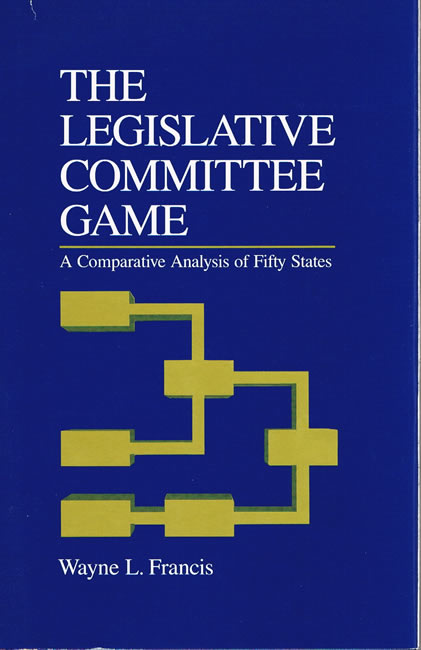The Legislative Committee GameA Comparative Analysis of Fifty StatesWayne L. Francis |
 1989 Political Science / Government / General 170 pp. 6x9 |
|||
|
read the full text of the book •
|
Combining a rational-choice approach with extensive empirical testing, Wayne Francis examines the legislative committee “game” in the United States, arguing that within the constitutional context rational behavior leads to decentralized agenda setting. The committee system represents the linchpin in this decentralization, and Francis charts the flow of decision making from individuals in subcommittees to full committee to the entire legislature. He employs all fifty state legislatures as a principal data base for this study, including a sample survey of over two thousand state legislators, committee assignment information from all fifty states, and other special collections of official or semi-official data. This overall survey is complemented by the literature on Congress and a more intensive study of two specific state legislatures. The leadership sets decentralizing events in motion at the beginning of each session by accommodating member requests for committee assignments and appointments as much as possible. Members sort themselves into committees and subcommittees that express their primary legislative interests and sponsor legislation more likely to be assigned to their own committees, enhancing their chances of obtaining committee approval. In addition, it is in the interest of any given committee to allow other committees to have their way if reciprocal treatment can be assured, as Professor Francis’s evidence shows in a number of ways. Majority party legislators prefer committee decisions over party caucus decisions because this decentralized decision making produces a higher bill passage rate, an important factor in assessing member satisfaction with outcomes. But inefficiencies in organization represent decentralized agenda setting’s underlying cost. Such inefficiencies are related to committee structure and procedure, including the number of committee assignments and the extent to which the preferences of legislators are taken into account in the design of committee jurisdictions. Committee tasks range from minor housekeeping functions to such activities as raising campaign funds, resolving chamber differences, and meeting with the chief executive, all of which contribute to the overall cost of legislative service—in essence, how many days each year legislators must spend in the state capital. The Legislative Committee Game provides the first comparative study of state legislatures and their internal functioning. Wayne L. Francis is Professor and Chair of the Political Science Department of the University of Florida. He is the author of several books, including Legislative Issues in the Fifty States: A Comparative Analysis and, with David Leege, Political Research: Design, Measurement, and Analysis. | |||

